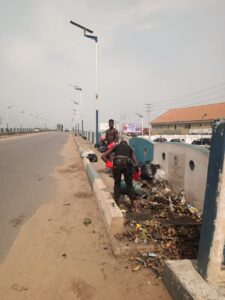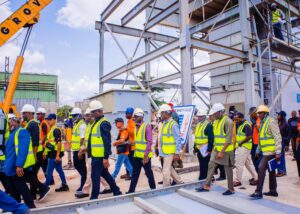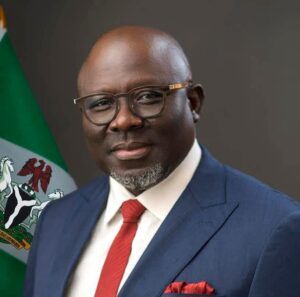
President Bola Tinubu
By Jon Egie
The Federal Government has awarded the construction of the Lagos-Calabar Coastal Highway to Hitech Road Construction Company.
[the_ad id=”16914″]
The development was announced by the Minister of Works, Mr Dave Umahi, during a meeting held in Lagos with engineers from the Federal Ministry of Works and the contractor’s team, the News Agency of Nigeria reported.
Umahi emphasized that this project, which aims to enhance connectivity across the nation, reflects President Bola Tinubu’s strong commitment to Nigeria’s restoration and rapid development.
He stressed that President Tinubu is eager to expedite the project’s commencement as part of his efforts to improve the country.
[the_ad id=”16918″]
The minister disclosed that this initial meeting was the first step in the process, with another meeting scheduled in two weeks to finalize the construction agreements.
The project will be executed as a Public Private Partnership and will be tolled upon completion, with the contractor already securing the necessary funding.
Phased construction, rail integration, and toll collection strategy
Umahi explained that the highway would be constructed in phases, with the completed sections being opened for use and toll collection.

The proposed route will link the Lagos-Badagry Expressway superhighway, the Fourth Mainland Bridge, Lekki Deep Sea Port Road, and connect various points in Northern Nigeria via Ogoja-Ikom.
[the_ad id=”16920″]
The project, with an initial design length of approximately 650 to 700 kilometres, will also feature rail lines running in the middle of the main carriageways.
Umahi revealed that the project is expected to stimulate tourism and include industrial clusters, such as hotels, factories, housing estates, and other amenities.
The minister highlighted the innovative use of 11-inch-thick concrete roads with 20-millimetre reinforcement, which will support local cement manufacturing, boost steel production from Ajaokuta, and utilize Nigeria’s abundant bitumen resources.
[the_ad_placement id=”advert”]
In his words:
“It is quite innovative and the giant of Africa is beginning to show her prowess and this is being revitalized by the captain of the ship, his excellency President Bola Tinubu.
“So, this is beautiful. Another good news is that this is going to be built on a concrete road of 11 inches thick with 20-millimeter reinforcement.”
However, the minister acknowledged that the project would encounter challenges due to its passage through mangroves, mashy areas, flood plains, and various soil types. As a result, a combination of construction methods, including pile-supported decks, sand filling, and retaining walls, will be employed.
[the_ad_placement id=”advert-1″]
In Umahi words:
“And so, there will be a combination of all kinds of construction methods, the deck on pile would be there, the sand filling would be there, the retaining walls would be there.
“So, it’s a very ambitious project, quite technical and highly rewarding.”
The second meeting, scheduled in two weeks, will focus on the business case study, allowing the project to progress to the design phase. Umahi noted that the Lagos-Calabar Coastal Highway is a groundbreaking project, the first of its kind in Africa.
“So, the second meeting will come up in two weeks where the business case study will be exposed to us, and we will give them a letter to own the project and then to engage in the design.
“The Lagos-Port Harcourt-Calabar Coastal Highway is the first of its kind in the whole of Africa,” he said.
Project significance and environmental considerations of the proposed Lagos-Calabar Coastal Highway
Nicholas Rizk, the consultant to Hitech Construction Company, highlighted that the chosen construction methods were well suited for a country with Nigeria’s vast landmass.
He emphasized that the project would traverse diverse topographical areas and benefit nine states along its route.
The highway will connect regions at both the national and international levels, serving as a vital link between South West, South East, South-South, Niger Delta, and other regions.
It will also integrate with existing federal roads, promoting economic and social development across the country.
[the_ad_placement id=”advert-2″]
In Rizk’s words: “We are connecting nine states and this road.
“In addition to the integration at the national level for Southwest and Southeast, South-South and Niger Delta, it connects with the Federal Roads going from Lagos to Sokoto.
“From Warri to Kaduna, from Port Harcourt to Kano-Maiduguri, and from Calabar to Maiduguri.
“So as the Minister mentioned, we have this coastal highway that is more or less 10 to 12 kilometres away from the shorelines to consider the issue of erosion and the sensitive environmental areas.”
The Lagos-Calabar Coastal Highway will start at Victoria Island near Eko Atlantic City, pass through the Lekki Coastal Road, Lekki Free Trade Zone, and the Dangote Refinery, connecting Ogun, Ondo, Delta, Edo, and reaching Calabar, Rizk explained.
Furthermore, he detailed how the project considered health, safety, and environmental factors, particularly in oil-producing areas.
Source: Nairametrics







